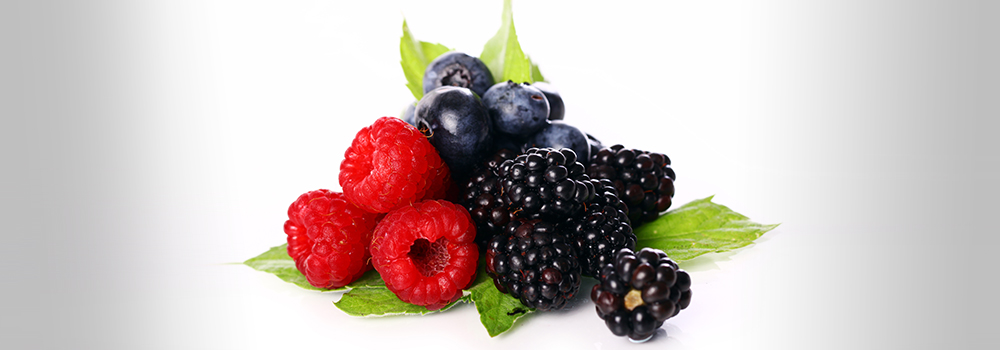Amongst the tide of advice on healthy living, a group of antioxidants containing polyphenols and flavanols often rate a mention. Indeed, these antioxidants are claimed to help with cardiovascular diseases, cancer, brain health, inflammation and even blood clotting. But do they live up to the hype?
Polyphenols and flavanols are compounds that have shot to fame because they are contained in many foods we associate with health - the so-called “superfoods”. And we are all very familiar with them as it is hard to miss the constant stream of articles pushing their benefits. In fact, this advice has become so ingrained in our quest for a longer and healthier life that we have, perhaps conveniently, ignored the science around their origin, use and benefits.
So, what are these foods? It’s a long list, but let’s concentrate on the main groups we all know:
- Berries
- Cherries
- Dark Chocolate
- Tea
- Turmeric
- Vegetables
- Red wine
- Seeds, chilli peppers and whole grains
In actual fact, more than 8000 polyphenols have been identified, which contain sub-groups such as flavanols, anthocyanins, phenolic acids, polyphenolic amides and many more. Different foods contain different compounds and in varying amounts. These compounds are often referenced to, and therefore associated with the color, spiciness, or bitterness of the food. This has propelled them into the status of superfoods for humans since their antioxidant activity must be good for us. After all, who doesn’t want to eliminate free radicals and oxidative stress that may cause disease?
Conveniently, many of these polyphenols have now been extracted and integrated into a vast variety of supplements, a once-a-day pill for better health. But the science on the benefits of polyphenols is very weak.
Remember resveratrol? The famed compound in red wine and the skin of grapes that suddenly made drinking red wine healthy? Well, it was a good marketing exercise, but a study from the John Hopkins University School of Medicine in Baltimore, Maryland, has failed to confirm resveratrol’s life-extending benefits. The study concluded that resveratrol “does not substantially influence health status and mortality risk”. Another study titled “Resveratrol: A Double-Edged Sword in Health Benefits” https://www.ncbi.nlm.nih.gov/pmc/articles/PMC6164842/ highlighted the fact that resveratrol may even be pro-oxidant in certain circumstances, totally negating any health benefits. This was confirmed by another study in Free Radical Biology & Medicine https://pubmed.ncbi.nlm.nih.gov/14744632/ that observed toxicity of some flavonoids.
To understand this, we need to look at:
- The purpose of polyphenols; and
- Polyphenols in the human body
It is tempting to think that the dark red juice of berries and wine, for instance, must be good for us. Likewise, the yellow stain of turmeric or the tartness of tea surely has health benefits. But these assumptions are flawed for two reasons:
Firstly, humans tend to associate a strong attribute such as bitterness, dark color or even the intense heat of chillies with health benefits despite any evidence. Most people will choose a berry over cauliflower when it comes to healthy eating, simply based on the product's color. But change the cauliflower to broccoli, and the choice is not that clear because we have introduced another strong color, dark green.
Secondly, and more importantly, the polyphenols in plants were created by the plant for the plant. Evolution did not sit down one day and decided to make them for our benefit. In nature, polyphenols aid in the defense against aggressors such as UV radiation, insects, fungi or other diseases. Likewise, giving them an attractive color makes them look appetizing, not for us but rather for the animals that help disperse their seeds.
This is a big fallacy in human thinking that makes us susceptible to believe something for which there is very little evidence. We may be the pinnacle of evolution, although this can be argued, but we are not at the center of it. So, to think that all these things are made for our benefit is nothing but false hope.
Science has confirmed this many times because research does not support a strong link between polyphenols and increased health. Of course, it is easy to find some link under laboratory conditions because subjects and dosage can be infinitely controlled until some benefit is found. But our life is far from a petri dish.
Studies have irrefutably shown that:
- The absorption of polyphenols in the human body is poor because they are metabolized in the digestion process, and their availability is therefore extremely limited
- Even if they survive digestion, there is no clear path for them to enter cells which is necessary to aid in alleviating oxidative stress
- The mechanisms behind how polyphenols may affect oxidative stress in humans are poorly understood; and
- there is no guidance on what are safe, or indeed, effective levels of polyphenol consumption
The recent explosion of “superfoods in a pill” is therefore worrying because any observed benefit may actually result from the consumption of the whole item rather than the polyphenols within.
Consuming fruit and vegetables as a whole has many other aspects to it, such as fibre, vitamins and minerals, all of which may have a synergistic effect that cannot be realized by isolating a group of compounds. Eating these foods whole also has the added benefit of contributing to our fullness, preventing us from eating more than we should. A pill negates all these benefits and may even introduce pro-oxidative effects due to excessive dosages.
So, where does this leave us? For one, no one disputes the fact that polyphenols may have some role to play in our health. But it may also be the synergistic effect of the whole item that ultimately makes a difference. However, there are many aspects to human health, and we should not look at polyphenols as a panacea for good health and longevity.
Instead, we should focus on the two aspects that matter to us:
- The mechanisms evolution has provided for humans to counter oxidative stress; and
- The scientific research supporting those mechanisms
Just like plants use polyphenols to protect themselves from the ravages of their environment, we also have evolved effective systems to deal with external as well as internal threats. The longevity of humans and many other animal species certainly points to the inescapable conclusion that these mechanisms are indeed very effective. So, let’s briefly focus on the two main defence systems:
- The immune system; and
- The antioxidant or free radical scavenging system
Our immune system needs no introduction or explanation. We know it is an incredibly complex yet effective means to protect us from external scourges such as bacteria and viruses or internal threats such as cancer cells. The antioxidant system is equally efficient in dealing with the oxidative stress caused by normal processes such as breathing or external aggressors such as toxins.
More importantly, both are supported by the human equivalent of polyphenols: Glutathione.
This incredibly important molecule, which evolution provided all oxygen using species with, has decades of scientific research supporting its role as our body’s “Master Antioxidant”. Unlike polyphenols, we understand the intricate mechanisms that underpin the critical importance of glutathione.
Similarly, science has concluded that:
- Glutathione production suffers with age, many chronic illnesses, strenuous exercise, or exposure to toxins; and, as a consequence
- Supplementing cellular glutathione has immeasurable benefits to our health
Unfortunately, however, successful glutathione supplementation has eluded science for a very long time. Despite the many products one may find that claim to do so, no research inconclusively backs their effectiveness in raising glutathione inside our cells where it is needed to do its work. This includes the much-hyped stalwarts of glutathione supplementation such as NAC or, indeed, glutathione itself. You can read why they are just hype at glutathione myth.
The Glyteine® in Continual-G®, on the other hand, has been proven to raise glutathione inside our cells. It does so quickly and effectively, even after a single dose. And the science behind its efficacy is irrefutable https://www.ncbi.nlm.nih.gov/pmc/articles/PMC5284489/
So, it becomes clear where our priorities should lie when it comes to supporting our health. Polyphenols, designed for plants, or our own powerful antioxidant and immune support, glutathione?






